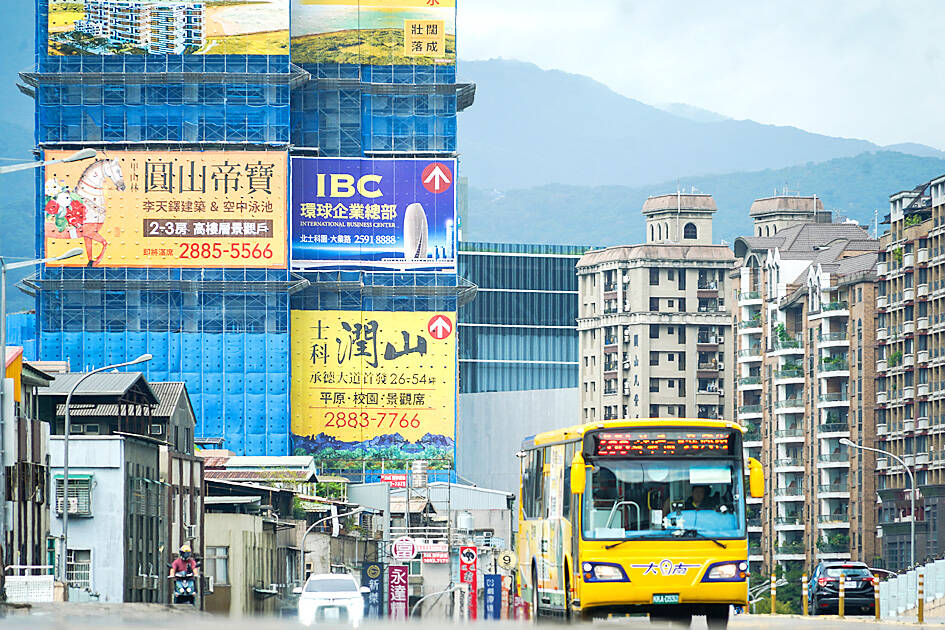Land deals last year soared more than twofold to NT$277.6 billion (US$8.45 billion), as developers actively built up land stock, but it would turn conservative this year amid the central bank’s lingering bid to cool real-estate lending, CBRE Ltd Taiwan (世邦魏理仕台灣) said yesterday.
The value suggested a 116 percent increase from a year earlier, as developers and builders raised land stock, encouraged by the housing fever in the first half of last year, CBRE said.
The uptrend was most pronounced in Taichung, where land deals amounted to NT$58.3 billion, or 21 percent of the total, it said.

Photo: CNA
Taichung-based Full Wang International Development Co (富旺國際開發) last month acquired a 945.31 ping (3,125m2) land plot for NT$1.24 billion, which it aims to turn into apartment complexes targeting first-home buyers, the company’s regulatory filing said.
The plot is near the city’s Shuinan Gateway Park (水湳經貿園區) and the government has completed construction on related public works, Full Wang said.
Meanwhile, commercial properties fared weaker, shrinking 7 percent to NT$125.1 billion last year due partly to a high base the previous year, CBRE said.
Industrial factories underpinned the segment, as tech firms bought idle factories to expand their capacity, CBRE real-estate appraisal head Winston Shih (施甫學) said.
Move-in ready factories in science parks are in demand, accounting for NT$66.1 billion of transactions last year, nearly a three-fold increase to a new high, Shih said.
That included Taiwan Semiconductor Manufacturing Co (台積電) buying an idle plant in Tainan from flat-panel display maker Innolux Corp (群創) for NT$17.14 billion; Micron Technology Taiwan Inc (台灣美光) acquiring an industrial property in Tainan from flat-panel supplier AUO Corp (友達) for NT$7.4 billion; and ASE Technology Holding Co (日月光投控) obtaining two industrial complexes in Kaohsiung for NT$5.26 billion, CBRE data showed.
“The top 10 commercial property transactions are all related to industrial properties, an unprecedented phenomenon,” Shih said.
Developers would turn low-key this year to avoid riling up the central bank, which is to step up inspections of mortgage operations and land financing to slow real-estate lending, CBRE said.
However, industrial land prices would receive further support from the expansion needs of local tech firms, it said, adding that industrial land prices in central and southern Taiwan have advanced 6.5 percent to 10 percent over the past three years.
Local life insurers could display more activism this year if insurance regulators ease yield requirements, CBRE said.

Vincent Wei led fellow Singaporean farmers around an empty Malaysian plot, laying out plans for a greenhouse and rows of leafy vegetables. What he pitched was not just space for crops, but a lifeline for growers struggling to make ends meet in a city-state with high prices and little vacant land. The future agriculture hub is part of a joint special economic zone launched last year by the two neighbors, expected to cost US$123 million and produce 10,000 tonnes of fresh produce annually. It is attracting Singaporean farmers with promises of cheaper land, labor and energy just over the border.

US actor Matthew McConaughey has filed recordings of his image and voice with US patent authorities to protect them from unauthorized usage by artificial intelligence (AI) platforms, a representative said earlier this week. Several video clips and audio recordings were registered by the commercial arm of the Just Keep Livin’ Foundation, a non-profit created by the Oscar-winning actor and his wife, Camila, according to the US Patent and Trademark Office database. Many artists are increasingly concerned about the uncontrolled use of their image via generative AI since the rollout of ChatGPT and other AI-powered tools. Several US states have adopted

A proposed billionaires’ tax in California has ignited a political uproar in Silicon Valley, with tech titans threatening to leave the state while California Governor Gavin Newsom of the Democratic Party maneuvers to defeat a levy that he fears would lead to an exodus of wealth. A technology mecca, California has more billionaires than any other US state — a few hundred, by some estimates. About half its personal income tax revenue, a financial backbone in the nearly US$350 billion budget, comes from the top 1 percent of earners. A large healthcare union is attempting to place a proposal before

KEEPING UP: The acquisition of a cleanroom in Taiwan would enable Micron to increase production in a market where demand continues to outpace supply, a Micron official said Micron Technology Inc has signed a letter of intent to buy a fabrication site in Taiwan from Powerchip Semiconductor Manufacturing Corp (力積電) for US$1.8 billion to expand its production of memory chips. Micron would take control of the P5 site in Miaoli County’s Tongluo Township (銅鑼) and plans to ramp up DRAM production in phases after the transaction closes in the second quarter, the company said in a statement on Saturday. The acquisition includes an existing 12 inch fab cleanroom of 27,871m2 and would further position Micron to address growing global demand for memory solutions, the company said. Micron expects the transaction to